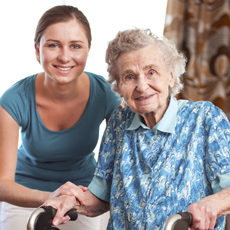
Fear of falling — a common condition in older adults — can lead to physical decline, lower quality of life and falls. But there are identifiable factors that clinicians can use to create prevention strategies for this population, say researchers.
In a study of 563 adults ages 60 and older, almost a fifth who used a walking aid and reported depressive symptoms at baseline developed fear of falling after two years, the investigators found.
A past fall is also associated with a fear of falling, they added. While fear of falling and falls are not directly related, they share common underlying risk factors such as age, gait and balance impairments, and vision problems, wrote Giulia Rivasi, M.D., University of Florence, Italy, and colleagues.
The study linked additional factors to fear of falling, including:
- Older age
- Lower performance in balance and physical function tests
- Higher comorbidity burden
- Higher mean antihypertensive use
- More frequent use of tricyclic antidepressants and sleeping medications
Recognizing elders who could benefit the most from interventions may help increase falls-related self-sufficiency, the researchers wrote. “These predictors can be easily assessed during a routine clinical evaluation,” they concluded.
The study was published in the May issue of JAMDA.




